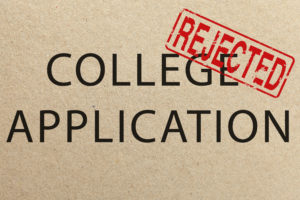
College admission reps have seen the good, the bad and the ugly. What are the most common college application mistakes?
We talked to the experts about how to simplify the college application process and reduce your stress by steering clear of damaging pitfalls.
Don’t test at the last minute
Start practicing as soon as possible! Start by taking a look at the test preparation section of the ACT’s website or the extensive SAT section of the College Board’s website. If possible, buy a test preparation book, take a course or get a tutor; no matter what, you need to practice, practice, practice.
Don’t be afraid to network
Connect with representatives at college fairs or contact professors or admissions offices via e-mail. You never know who may be a great connection or point you to a possible scholarship.
Don’t undervalue your essay
Your personal statement is “the great equalizer.” Most experts will tell you that the personal statement is the most essential part of the application because you paint a picture to illustrate your academic and extracurricular qualifications.
Don’t skip college visits
Dara Lewis graduated from high school at age 16 and is spending a year at Montgomery Community College while applying to four-year universities. She offers this advice: “Schools sound nice on their websites, but it’s good to visit so you can get a feel. Ask yourself: Can I see myself here?” If possible, visit when the school is not sponsoring prospective students to experience the true flavor of the place.
Don’t get tunnel vision
Lewis went on to share how her current experience affected her future outlook: “Have an open mind about college and the whole process! Don’t be so stuck in your own way that you miss opportunities. For example, I wasn’t keen on the idea at first that I might have to do ROTC to pay for school so I can become a doctor. Then I discovered that after I get my degree I could travel with the Army as a doctor on base, a benefit I hadn’t thought of. So just keep an open mind.”
Don’t sell yourself short
Colleges are not looking only for students from pricey private schools or the rare genius who turned his or her lemonade stand into a multimillion dollar company at age 14. Still, you want to stand out in a large applicant pool.
How do you do that?
First, value your life experience and then communicate that in your application. Show how you had a creative idea and produced a great result. Describe the people involved and the impact it had on the community, no matter how big or small it might seem to you.
Thanks are due to Lauren Bush, Program Associate at the American Dental Education Association’s Center for Educational Policy and Research, for serving as a source for this article.
